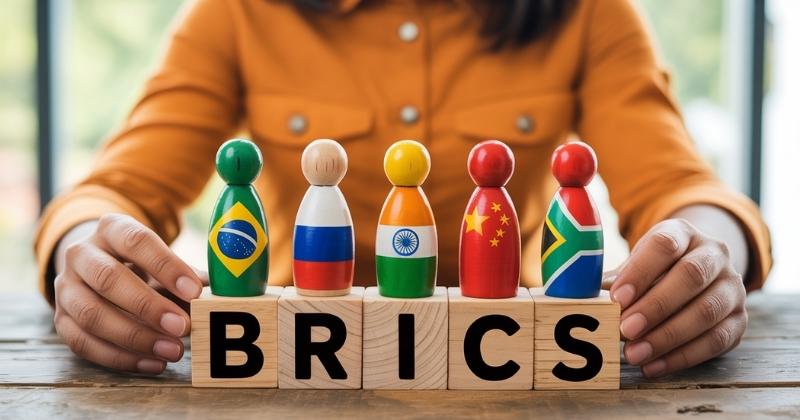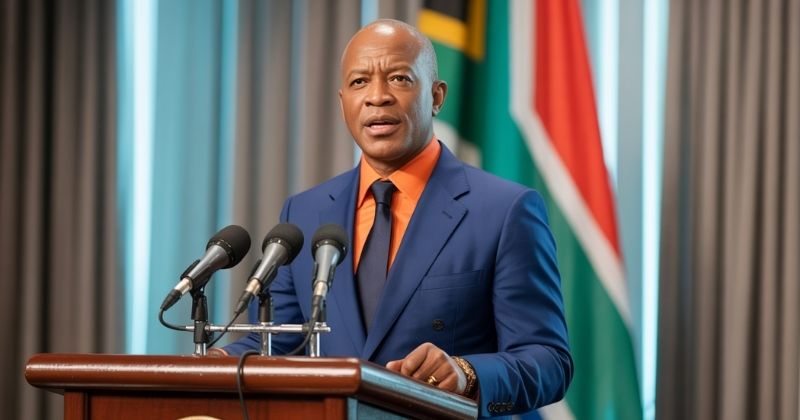
BRICS is a group of emerging economies working to shift global influence by strengthening cooperation among developing nations. Since joining in 2010, South Africa’s role has grown alongside the bloc’s ambitions. The recent expansion to BRICS+ reflects a broader push to reduce reliance on Western-led institutions. For South Africa, this brings both strategic opportunities and economic challenges. As the original African member, it acts as a vital link between BRICS and the continent.
Key Takeaways
- BRICS Aims To Reshape Global Influence: The BRICS group was established to give emerging economies a stronger collective voice in international affairs, aiming to reform global institutions and reduce long-term dependence on Western-led financial and political systems.
- South Africa Serves As Africa’s Bridge To BRICS: South Africa’s inclusion is rooted not just in its economic profile but in its strategic importance as a representative of African interests and its ability to facilitate regional engagement within the bloc.
- BRICS+ Expansion Creates New Trade And Energy Opportunities: With the addition of countries like Saudi Arabia and Egypt, South Africa gains access to broader markets and potential partnerships in energy and infrastructure.
About Arcadia Finance
Arcadia Finance makes borrowing simple. Choose from 19 reliable, NCR-compliant lenders with zero application fees and a fast, straightforward process designed to meet your needs.
What Is BRICS?
The countries that make up BRICS include Brazil, Russia, India, China and South Africa, along with five newly admitted members. They form an informal coalition of emerging economies aiming to increase their influence in international affairs. The group was established in 2009, based on concerns that global institutions were overly influenced by Western powers and no longer reflected the interests of developing nations. BRICS has focused on aligning economic and diplomatic policies among its members, creating alternative financial institutions, and reducing reliance on the United States dollar.
Despite these efforts, the bloc has faced ongoing internal disagreements on several issues, such as how to engage with the United States and how to respond to Russia’s invasion of Ukraine. Its recent expansion has enhanced its global profile but also added new challenges in terms of maintaining unity. While some observers believe BRICS has the potential to shift the balance of global power, others point out that its efforts to introduce a shared currency or build effective alternatives to current global structures may face serious obstacles.

What Does BRICS Do?
The BRICS group functions through annual meetings attended by the heads of state, with each member country rotating as chair for one calendar year. The chair is responsible for setting that year’s agenda and hosting the summit. The bloc operates on a consensus model and maintains a largely informal structure. It does not have a formal constitution, permanent secretariat, or shared financial reserves.
Promoting Representation in Global Institutions
One of BRICS’ central aims is to amplify the voice of emerging economies within international bodies. The group calls for reform of major institutions, including efforts to expand permanent representation on the United Nations Security Council. BRICS often forms negotiating blocs within these organisations to influence outcomes. For example, several BRICS nations have resisted UN resolutions condemning Russia’s actions in Ukraine and have coordinated positions on global issues such as the Iran nuclear agreement and conflicts in regions including Afghanistan, Gaza, Libya and Syria.
Encouraging Economic Policy Coordination
Following the severe impact of the 2008 global financial crisis on its member states, BRICS has increasingly focused on aligning economic strategies. The bloc discusses tariff structures, investment rules, and restrictions on the export of critical resources. Between 2001 and 2021, BRICS countries saw a fourfold increase in annual foreign direct investment inflows. However, this growth has tapered off more recently due to shifting global economic conditions.
Reducing Dependence on the US Dollar
There has been ongoing concern within BRICS about the global dominance of the US dollar, especially given the financial influence it gives to Western powers through sanctions and currency-based restrictions. In response, BRICS countries have pushed for greater use of local currencies in cross-border trade. There have also been proposals to create a shared BRICS currency, although this idea remains in the early stages of development.
Building Alternative Financial Institutions
BRICS has created its own institutions to rival traditional Western-led lenders. The New Development Bank (NDB) serves a similar role to the World Bank by funding infrastructure and development projects across member countries. The Contingent Reserve Arrangement (CRA) provides financial support in times of balance-of-payment pressures, mirroring aspects of the International Monetary Fund. These mechanisms are intended to support cooperation between developing countries and reduce reliance on Western financial systems.

The BRICS Economy
Population and Economic Output
At present, the BRICS nations collectively account for around 3.3 billion people, which represents more than 40 percent of the global population.
Using purchasing power parity as a measure, the BRICS countries contribute approximately 37.3 percent of the world’s gross domestic product, based on data from the International Monetary Fund. China alone contributes 19.05 percent, followed by India with 8.23 percent. In contrast, the United States and the European Union each contribute roughly 14.5 percent.
Commodities and Global Trade Influence
The BRICS bloc is gaining greater significance in global commodities trading, particularly in oil markets.
With new members like Iran and the United Arab Emirates already added, and Saudi Arabia possibly joining, BRICS could be responsible for close to half of the world’s oil production. The group may also account for around 35 percent of global oil consumption, according to S&P Global. The report highlights that Saudi Arabia’s full participation would further strengthen BRICS as a major force in global commodities markets.
Labour, Informality, and Employment
BRICS countries also represent a large labour force and consumer market, owing to their population size.
In 2024, the combined labour force participation rate across BRICS nations was 60.6 percent, amounting to roughly 1.5 billion active workers, according to the International Labour Organization. However, a notable gender gap persists, with male participation at 73.9 percent compared to 47.4 percent for women.
Informal employment remains prevalent. Approximately 934.4 million individuals work in the informal sector, with the largest portion based in India. A 2023 International Labour Organization report emphasised that enhancing productivity will require a move towards formal jobs and improved working standards.
As of this year, the unemployment rate across BRICS countries is 5.3 percent, which corresponds to 84.7 million unemployed people.
South Africa’s Role In BRICS
South Africa’s inclusion in the BRICS grouping has raised questions, largely because its economy is the smallest among the founding members and falls behind several nations that were not admitted, such as Indonesia. However, its membership was not based solely on economic size. It represented a calculated geopolitical move to incorporate the African continent into BRICS. South Africa acts as a key link between BRICS and Africa, using its position to promote African priorities and secure the region a presence in global conversations.
Since the end of apartheid, South Africa has built a track record as a dependable regional leader, using its influence within the African Union to drive cross-border cooperation and push for African involvement in international decision-making platforms. Its role is not limited to diplomacy. South Africa has also played an active part in peacebuilding, humanitarian relief, conflict mediation, and development projects throughout the continent. This consistent involvement has helped establish it as a stabilising presence in Africa.
Although Nigeria’s economy is marginally larger, South Africa offers distinct advantages, such as a more advanced industrial sector, vast mineral reserves, and a policy environment that is more conducive to foreign investment. World Bank data shows that South Africa contributes roughly 22 percent of the continent’s gross domestic product. Recognised as an upper middle-income country, it has maintained a per capita income above 5,000 US dollars since 2005, reaching a high point of just over 6,000 dollars in 2010. Most importantly, South Africa’s strategic benefit to BRICS lies beyond economic output. It serves as a gateway for engaging with Africa in a way that could offer long-term advantages for all BRICS members.

The Expanded BRICS And Its Implications For South Africa
The shift from BRICS to BRICS+ has increased the group’s global presence and has altered the nature of South Africa’s involvement. South Africa is no longer seen only as a regional actor, but now plays a more prominent role as a connector between developing nations and more established Western countries. With the inclusion of new members such as Saudi Arabia, Iran, and Egypt, the group now has broader geographic and political reach, giving South Africa a wider platform to support its diplomatic objectives. The entry of Ethiopia and Egypt means that South Africa is no longer the only African voice within BRICS, allowing for a more coordinated African approach within the alliance. This development makes it possible for African members to work jointly on matters such as fair trade, access to infrastructure funding, and reforming debt arrangements.
The expanded group offers South Africa access to new markets and broader trade networks. This wider range of partners is useful as South Africa aims to lessen its reliance on trade with Western economies. The inclusion of energy-producing countries like Saudi Arabia presents new possibilities for cooperation in the energy sector, which is particularly relevant given South Africa’s current energy problems. Collaborative efforts in renewable energy projects and sustainable technologies could help South Africa progress towards its long-term environmental goals, while also responding to urgent domestic energy needs.
Conclusion
South Africa’s participation in BRICS and its recent expansion to BRICS+ marks a shift in the country’s international position. While South Africa may not match other members in economic size, its strategic location, influence in African diplomacy, and established financial infrastructure give it a distinct advantage. As BRICS aims to counterbalance Western institutions, South Africa is well-placed to act as a regional conduit for investment, trade, and cooperation. The expansion of BRICS also brings opportunities for energy collaboration, infrastructure development, and enhanced policy alignment, areas that could help address South Africa’s domestic challenges while strengthening its global ties.
Frequently Asked Questions
The primary aim of BRICS is to strengthen the global influence of emerging economies by encouraging cooperation on economic policy, developing alternative financial institutions, and reducing the dominance of Western-led systems, particularly the US dollar.
South Africa was included to provide representation for the African continent and to expand the geopolitical reach of the group. It plays a strategic role by promoting African priorities and serving as a key entry point to African markets for the rest of the bloc.
BRICS+ is the expanded form of the original BRICS group, now including additional countries such as Saudi Arabia, Egypt, and Iran. This expansion has increased the group’s global presence and added greater diversity in terms of political influence, resources, and regional reach.
No, BRICS does not currently have a shared currency. Although proposals have been made to introduce one in the future to reduce reliance on the US dollar, these discussions are still in the early stages and face significant technical and political challenges.
BRICS gives South Africa access to larger and more diverse markets, creates opportunities for trade and investment partnerships, and encourages collaboration in areas such as infrastructure and energy. These benefits help the country reduce its reliance on Western economies and improve its economic resilience.
Fast, uncomplicated, and trustworthy loan comparisons
At Arcadia Finance, you can compare loan offers from multiple lenders with no obligation and free of charge. Get a clear overview of your options and choose the best deal for you.
Fill out our form today to easily compare interest rates from 19 banks and find the right loan for you.

